Goering: Schacht
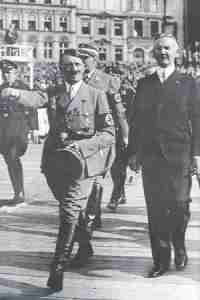
Mr. Justice Jackson: Now, as early as 1933 you began a real program to rearm Germany regardless of any treaty limitations, did you not?
Goering: That is not correct.
Mr. Justice Jackson: All right; tell us when you started.
Goering: After all the proposals of disarmament which the Fuehrer made were refused, that is, shortly after our withdrawal from the disarmament conference he made several proposals for a limitation; but, since these were not taken seriously or discussed, he ordered a complete rearmament. At the end of 1933 already certain slight preparations were started by me personally, to the extent that I had made some inconsiderable preparations in regard to the air and had also undertaken a certain militarization of the uniformed police. But that was done by me personally; I bear the responsibility.
Mr. Justice Jackson: Well, then, the militarization of the police auxiliary was not a state affair. It was your personal affair. What do you mean by that?
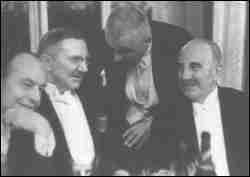
Mr. Justice Jackson: I want to ask you some questions from your interrogation of the 17th day of October, 1945. I will first read you the questions and answers as they appear in the interrogations and I shall then ask you whether you gave those answers, and then you can make the explanations if you desire, and I assume you do. The interrogation reads:
Question: I wanted to ask you today about some of the economic history of the period. When was the armament program first discussed, that is, the rearmament program? What year?
Answer: Immediately; in 1933.
Question: In other words, [Hjalmar] Schacht had assumed the obligation at that time already, to raise funds for the rearmament program?
Answer: Yes. But, of course, in co-operation with the Minister of Finance.
Question: During the years 1933 to 1935, before general conscription came in, naturally, the rearmament was a secret rearmament, was it not?
Answer: Yes.
Question: So that money that was used outside of the budget would have to be raised by some secret means not to be known to foreign nations?
Answer: Yes, unless they could be raised from normal Army funds.
Question: That is to say, you had a small budget for the standing 100,000 man Army which was open, and the rest of the rearmament had to be from secret sources?
Answer: Yes.
Goering: More or less; generally speaking that is correct. I have these remarks to make: Firstly, I was asked when rearmament had been discussed, not when it had been started. It had, of course, been discussed already in the year 1933, because it was clear at once that our government had to do something about it, that is to say, to demand that the others should disarm, and, if they did not disarm, that we should rearm. These things required discussion. The conclusion of the discussion and the formulation into a definite order followed after the failure of our attempts to get other countries to disarm. As soon as we, or rather the Fuehrer, saw that his proposals would not be accepted under any circumstances, a gradual rearmament, of course, began to take place.
There was no reason whatsoever why we should inform the world about what we were doing in the way of rearmament. We were under no obligation to do that, nor was it expedient. Herr Schacht, in the year 1933 at the very beginning, could not raise any funds because at the start he held no office. He was able to do this only at a later date. And here it was understandable that the funds had to be raised through the Minister of Finance and the President of the Reichsbank according to the wishes and the orders of the Fuehrer, especially as we had left no doubt that, if the other side did not disarm, we would rearm. That had already been set down on our Party program since 1921, and quite openly.
Mr. Justice Jackson: Is it not a fact that on the 21st of May 1935, by a secret decree, Schacht was named Plenipotentiary for the War Economy?
Goering: The date--if you will kindly submit the decree to me, then I can tell you exactly. I have not the dates of decrees and laws in my head, especially if they do not have anything to do with me personally; but that can be seen from the decree.

Goering: If Herr Schacht made this suggestion shortly after his appointment, then that appointment could not have taken place until 1936, because not until the summer of 1936 did Herr Schacht, together with the Minister of War, Von Blomberg, make the proposal that I should become Commissioner for Raw Materials and Foreign Currency.
Mr. Justice Jackson: Well, I ask you if you did not give this answer to the American interrogator on the 10th day of October 1945, referring to Schacht: "He made the suggestion that I was to become the Commissioner for Raw Materials and Foreign Currency. He had the idea that, in that position, I could give the Minister for Economics and the President of the Reichsbank valuable support." How did you give that answer, and is that information correct?
Goering: Will you please repeat.
Mr. Justice Jackson: Referring to Schacht, the record shows that you said:
He made the suggestion that I was to become the Commissioner for Raw Materials and Foreign Currency. He had the idea that, in that position, I could give the Minister for Economics and the President of the Reichsbank valuable support.
Goering: That is absolutely correct, with the exception of the word "Reichstagsprasident;" that ought to be President of the Reichsbank.Mr. Justice Jackson: Yes. That is the way I have it.
Goering: It sounded like "Reichstagsprasident" over the earphones.
Mr. Justice Jackson:
Moreover, he was very outspoken in the suggestion that he and Blomberg made, that I should be put in charge of the Four-Year Plan. However, Schacht's idea was that I did not know very much about economy, and that he could easily hide behind my back.
Goering: That I said the other day quite clearly.Mr. Justice Jackson: Now, from that time on you and Schacht collaborated for some time in preparing a rearmament program, did you not?
Goering: From that time on I worked together with Schacht in economic matters and covered the whole field of German economy, including the armament program, which of course was a sine qua non for the reassumed German military sovereignty.
Mr. Justice Jackson: And you and he had some jurisdictional differences and executed an agreement settling your different spheres of authority, did you not?
Goering: Yes.
Mr. Justice Jackson: And that was in 1937 on the 7th of July, right?
Goering: On that day a certain proposal for a settlement was made, but this did not lead to anything final being accomplished. That was because of the nature of the two posts and our personalities. Both of us, I, as Delegate for the Four-Year Plan, and Herr Schacht, as Minister of Economics and President of the Reichsbank, were able to exercise very great influence on German economy. As Herr Schacht also had a very, strong personality and felt his position keenly, and I likewise was not inclined to hide my light under a bushel, whether we were friends or not we could not help getting in each other's way because of this question of authority, and one of us had finally to give in to the other.
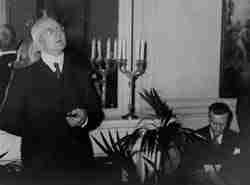
Goering: First he resigned from the Reich Ministry of Economy in November 1937, and, as far as I know, he resigned as President of the Reichsbank at the end of 1938, but I cannot be certain about that date.
Mr. Justice Jackson: There was no disagreement between you and him that the program of rearmament should be carried through, was there? You disagreed only in the methods of doing it.
Goering: I assume that Herr Schacht also, as a good German, was, of course, ready to put all his strength at the disposal of Germany's rearmament, in order that Germany should be strong; and therefore differences could have occurred only in regard to methods, for neither Herr Schacht nor I was arming for a war of aggression.
Mr. Justice Jackson: And after he left the rearmament work he remained as a Minister without Portfolio and sat in the Reichstag for some time, did he?
Goering: That is correct. The Fuehrer wished it because, I believe, he wanted in this way to express his recognition of Herr Schacht.
1946 Nuremberg Tribunal: On day 86, Hermann Goering is cross-examined by Justice Jackson, the chief US prosecutor.
Mr. Justice Jackson: Now, you were shown a document, 3700-PS, written by Schacht to you, and you have said that you received it?
Goering: Yes, I remember.
Mr. Justice Jackson: Now, you and Schacht were somewhat rivals in the economic field at one period, were you not?
Goering: I explained that only recently, and to what extent.
Mr. Justice Jackson: You wanted his position abolished in the event of war and he wanted your position abolished in event of war, did he not--your economic position?
Goering: Not quite. They were two similar authorities having similar powers at the same time, two personalities, and that in the long run was not possible. It simply had to be decided which one of the two should be the sole authority. That would have been especially necessary in case of a mobilization.
Mr. Justice Jackson: You, in testifying on the 17th day of October last, as to your relations with Schacht, made this statement, did you not, in reference to your disagreements with Schacht: "This I must underline: Schacht always tried to maneuver for a new post, while all the other ministers co-operated absolutely." Did you say that?
Goering: Not exactly as it is there, but I wanted to emphasize that, contrary to the other ministers who obediently followed my directives for the Four Year Plan, I had certain difficulties with Schacht, which I have already explained, due to his original and strong personality.
Mr. Justice Jackson: The question was whether you made that statement in substance or in those words?
Goering: Not exactly in these words, but as I have just explained, in substance.
Mr. Justice Jackson: Now, do you have in mind Schacht's letter to you, Document Number 3700-PS?
Goering: Yes, I read it a short time ago.
Mr. Justice Jackson: And in that letter Schacht said this to you, did he not, referring to 3700-PS? "It may be militarily necessary. . . " Do you want to follow it? [Document 3700-PS was submitted to the witness.]
It may be militarily necessary to conscript the 15-year-olds, but it will heavily tax the fighting morale of the German people. The facts as the German people see them are as follows:
First, the original prospect of a short war has not been realized.
Second, the prospective quick victory over England by the Air Force did not materialize.
Third, the public statement that Germany would remain free of enemy air raids has not been fulfilled.
Fourth, the repeated announcements that the Russian resistance was definitely broken have been proved to be untrue.
Fifth, Allied supplies of arms to Russia, and the manpower reserves of Russia have, on the contrary, been sufficient to bring continuous heavy counterattacks against our Eastern Front.
Sixth, the original victorious advance into Egypt has been halted after repeated attempts.
Seventh, the landing of the Allies in North and West Africa, declared impossible, has nevertheless been accomplished.
Eighth, the extremely large amount of shipping space which was required for this landing has shown that our U-boats, in spite of their great successes, did not suffice to prevent this transport. In addition, the reductions in civilian traffic, in material for armaments, and in the availability of manpower are obvious to all the people. The conscription of the 15-year-olds will increase the doubts concerning the termination of this war.
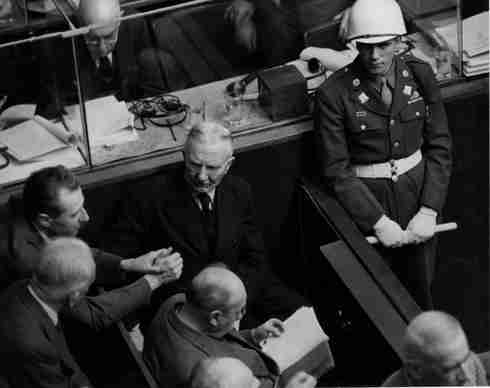
Mr. Justice Jackson: Do you know when Schacht was sent to the concentration camp? Do you know the date of that?
Goering: Not exactly, but now that you remind me of it, I can say that this letter certainly was not written in 1944 because in November 1944, I believe, Mr. Schacht was already in the concentration camp; consequently, it must date back to November 1943.
Mr. Justice Jackson: And he was sent to the concentration camp shortly after dispatching that letter to you, wasn't he?
Goering: No, that is not correct.
Mr. Justice Jackson: How much longer was he at large?
Goering: The letter is of 3 November 1943, as we have just found. I heard about the arrest of Schacht only after the attempt on the life of the Fuehrer and after my return a few days later, after an illness of some time, that is to say, in September 1944. There is not the least connection between this letter and his arrest, because, when I asked about his arrest, I was told definitely it was in connection with the 20th of July.
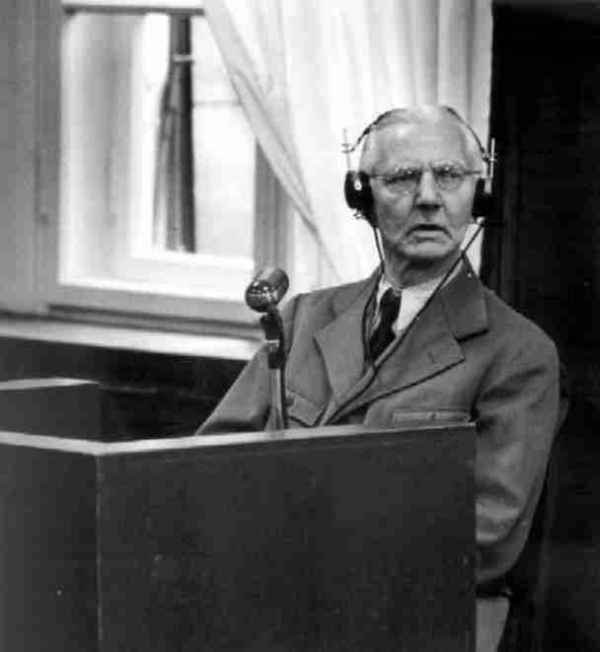





The Nuremberg Tribunal Biographies
Caution: As always, these excerpts from trial testimony should not necessarily be mistaken for fact. It should be kept in mind that they are the sometimes-desperate statements of hard-pressed defendants seeking to avoid culpability and shift responsibility from charges that, should they be found guilty, can possibly be punishable by death.
Disclaimer:The Propagander!™ includes diverse and controversial materials--such as excerpts from the writings of racists and anti-Semites--so that its readers can learn the nature and extent of hate and anti-Semitic discourse. It is our sincere belief that only the informed citizen can prevail over the ignorance of Racialist "thought." Far from approving these writings, The Propagander!™ condemns racism in all of its forms and manifestations.
Source Note: The trial portion of this material, which is available in its entirety at the outstanding Avalon and Nizkor sites, is being presented here in a catagorized form for ease of study and is not meant to supplant or replace these highly recommended sources.
Fair Use Notice: This site--The Propagander!™--may contain copyrighted material the use of which has not always been specifically authorized by the copyright owner. We are making such material available in our efforts to advance understanding of historical, political, human rights, economic, democracy, scientific, environmental, and social justice issues, etc. We believe this constitutes a "fair use" of any such copyrighted material as provided for in section 107 of the US Copyright Law. In accordance with Title 17 U.S.C. Section 107, the material on this site is distributed without profit to those who have expressed a prior interest in receiving the included information for research and educational purposes. If you wish to use copyrighted material from this site for purposes of your own that go beyond 'fair use', you must obtain permission from the copyright owner.

